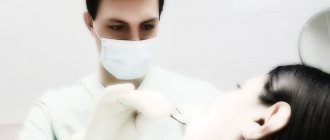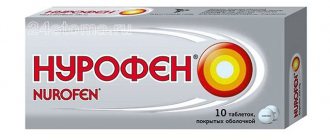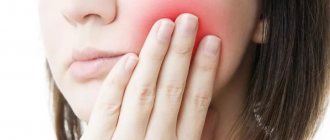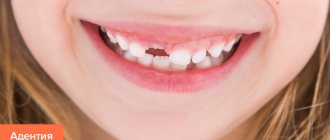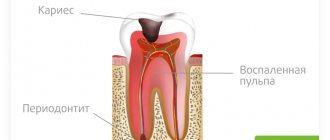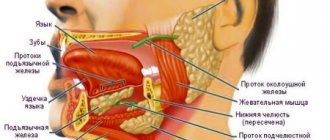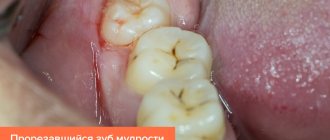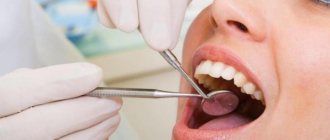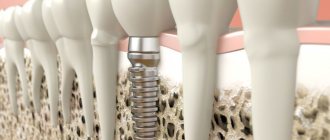Why do my teeth hurt at night but not during the day?
It would be more correct to say that your teeth hurt more at night. During the day there are too many distractions that prevent you from focusing on your feelings. Work, household chores and even simple walking force the brain to work in a different direction, which leads to less pain.
Another, main factor is physiological. In the evening, the level of corticosteroids in the body begins to decrease; they are “responsible” for reducing pain. Hormone production reaches a minimum between midnight and five in the morning, after which the tooth gradually begins to fall out. Usually by this time the exhausted body “gives up”, the person falls asleep and gets a short respite.
Another cause of night pain is the horizontal position of the body during sleep. The rush of blood to the head increases, while the nerve roots are compressed and the pain intensifies. This is especially noticeable with pulpitis, when the sensations become unbearable.
Important.
If you notice increased pain while lying down, raise the pillow higher and practically sit down. The blood will drain from your head and it will become a little easier.
It’s a special problem when the tooth under the filling hurts. This means that an infection has entered the treated cavity and an inflammatory process has begun. The resulting pus, even in a minimal amount, has no way out and begins to compress the nerve roots, which leads to severe acute pain that can even radiate to the ear and throat.
At night, it is also possible to experience minor pain after the removal of a tooth or nerve, as well as after treatment of deep caries. This is normal and does not require any serious measures to be taken. In this case, it is enough to take a tablet of any analgesic or rinse your mouth with a warm soda solution.
Important.
If you had a difficult removal and then experienced severe pain at night, you should immediately consult a doctor in the morning. Alternatively, bone fragments could remain in the socket. In this case, the entire jaw will hurt, and it will be almost impossible to relieve the sensation even with strong medications.
Symptoms
When visiting a dentist, the patient should immediately voice his symptoms. Based on the sensations described, an experienced dentist can immediately determine the nature of the pain. The pain can be aching in nature, as a rule, the sensations are the most vivid and unpleasant. If the entire lower or upper jaw aches, you should immediately contact the clinic.
However, most often the pain overtakes a person at night. In this case, you should not endure the pain; it is best to take a painkiller tablet. Acute pain usually manifests itself in the presence of serious pathological processes, for example, developing pulpitis, deep caries or periodontitis. In this case, the acute pain may be throbbing and may intensify with each new push.
Eating too hot or cold food can trigger severe pain. When it gets on the surface of a diseased tooth, piercing pain can immediately cover the entire jaw. However, unpleasant sensations are usually short-lived and decrease in the absence of the stimulus.
Dead tooth hurts
After the nerve is removed, the tooth may respond for some time with mild pain to pressure or biting, including at night. This is a normal reaction. In these cases, it is enough to take a painkiller tablet.
If the pain becomes twitching and intensifies, it means that the nerve was not completely removed or the doctor made mistakes related to cleaning the canals or installing a filling. The biggest problem is that neither pills nor folk remedies will help. Start looking for a doctor right away.
Wisdom tooth hurts
A special unit in our body is the wisdom tooth. It usually erupts at the age of 18-25 years, and severe pain may occur. The molar breaks through the bone and gum tissue, essentially tearing it apart. At night, the pain may intensify; it can be relieved with the help of pain-relieving gels (Cholisal, Metrogyl Denta, Asepta) or analgesics.
It’s good if the tooth runs vertically and has enough space in the gum. A much worse option is when the molar breaks through at an angle or even horizontally. The “figure eight” puts pressure on the roots of neighboring teeth and displaces them. In addition to pain, swelling of the gums and cheeks may appear, as well as an increase in body temperature. As a temporary option, you can take painkillers, but the problem will have to be resolved with a surgeon. As always, the sooner the better.
A wisdom tooth can simply hurt due to caries, pulpitis, periodontitis, or cysts. Another reason is inflammation of the so-called hood, a fold on the gum that forms when teeth erupt. The cause of pericoronitis is the accumulation of food particles, which gradually begin to rot, accompanied by pain in the “eight” area. In the most severe situations, pus begins to secrete.
To relieve pain, you can rinse your mouth with warm infusions of herbs (sage, chamomile), use a gel and take a pain reliever. And in the morning - to the doctor.
Important.
A wisdom tooth is also a tooth. But, if it interferes with the normal position of the teeth, causes crowding, or if the dentin is deeply damaged, dentists recommend removing it.
Treatment options
The choice of treatment for a diseased tooth often depends on the degree of advanced disease. At the initial stage, caries is removed using a drill, and upon completion, a filling is installed. When the extent of the damage is more extensive, one of the following technologies is used.
- Veneers are one of the most preferred options. These are thin plates that are made of ceramic porcelain. They are installed on the outer surface of the tooth, correcting its shape. Veneers are made individually for each client, using a tooth impression. If the plate is properly manufactured and installed, it will last an average of 25 years.
- Crowns are used when there is practically nothing left of the tooth. Another indication for installing crowns is the destruction of the cutting edge of the tooth. Just like veneers, they are made individually for each client, exactly repeating the color of adjacent teeth.
- Implants are used when there is nothing left of the tooth. Implantation of anterior teeth takes place in several stages. A pin is installed in the bone in place of the former tooth. Some time after the gums have healed, a crown is placed on the post. This method is not suitable for everyone and has many contraindications, and it is also expensive. However, he has proven himself very well.
- Restoration with a pin is used when the tooth root is not yet damaged. Pins are installed inside the channels, on top of which a crown is attached. The outer surface of the tooth looks natural, its color is as similar as possible to the neighboring teeth.
- A prosthesis, unlike an implant, is significantly cheaper in price. Various fasteners and materials are used in the manufacture of prostheses. The most common type is a bridge. In this case, a crown is made for 3 teeth: one patient and 2 adjacent healthy teeth.
Reasons not related to teeth
With severe toothache, it seems that everything hurts - the ear, throat, head and even the skin on the face. In some cases, a person is not able to determine the source of the sensation and believes that a bad tooth is to blame.
Night pain similar to toothache can also occur in the following cases:
- For inflammation of the trigeminal nerve. Characterized by a nagging, severe pain, localized in the area of one tooth or spread throughout the entire jaw. This is explained by the fact that the branches of the nerve are located very close to the roots of the teeth and when they become inflamed, pain occurs that is very similar to toothache.
- For sinusitis, sinusitis, otitis media. Swollen tissues and sinuses filled with purulent contents put pressure on the roots of the teeth. The resulting pain is very similar to toothache. In most cases, it is observed in children who find it difficult to correctly determine the location of pain
- Under stress. Chronic night pain can be considered as one of the factors confirming the stressful state of the body.
Important.
Even if you have such assumptions, you will still have to visit the dentist. This must be done in order to exclude inflammatory diseases of the teeth and oral cavity, correctly diagnose and prescribe the correct treatment.
What diseases can cause severe toothache?
Acute toothache can be a companion to many diseases of the oral cavity (and not only). Here are the most common ones.
Caries
A carious cavity occurs as a result of the process of demineralization and destruction of hard tooth tissues. Most often, pain appears after eating sour or sweet, cold or hot food.
Deep caries, which is accompanied by complete tooth destruction, turns into pulpitis and then pain occurs even without exposure to external irritants.
In some patients, the disease develops asymptomatically: pain appears only at the final stage, when the tooth cannot be saved.
Pulpitis
The source of pain is the neurovascular bundle, which is located inside the tooth. If it becomes inflamed, a person will know about it first by aching, and then by acute toothache, disturbing even at rest.
The pulp suffers, for the most part, from the activity of pathogenic microorganisms, especially streptococci and staphylococci. And untreated caries only makes the situation worse. Another cause of pulpitis is tooth trauma (fractures, enamel chips, crown fractures).
The negative influence of temperature or chemical factors is the most rare cause of the problem.
Gingivitis
The disease is characterized by inflammation of the gums (or a specific area). It is provoked by the same dental plaque, which, deposited in places that are difficult to reach for cleaning teeth, turns into tartar.
Gingivitis is accompanied by swelling and redness of the gums, bleeding and pinpoint hemorrhages, hyperemia, bad breath, and less commonly, the appearance of erosions.
More susceptible to it than others:
- children and adolescents whose teeth are actively growing,
- women taking oral contraceptives,
- women during menstruation,
- patients taking immunosuppressants,
- lovers of tobacco products, as well as spicy and hot food.
Stomatitis
A rather unpleasant phenomenon characterized by inflammation of the oral mucosa of various etiologies. If redness and swelling are observed, we can talk about catarrhal stomatitis, blisters - herpetic, ulcers - aphthous or ulcerative. In addition to pain, the patient may experience a burning sensation, especially after eating.
Stomatitis can be independent and accompany other diseases. They often accompany pemphigus, systemic scleroderma and streptoderma, and immunodeficiency states. But more often they appear on their own due to mechanical injuries, uncomfortable prostheses, and infections entering the body.
Periodontitis
With periodontitis, the tissues surrounding the tooth become inflamed, resulting in the destruction of the periodontal junction. In this case, the gums bleed and become inflamed, and sometimes abscesses and fistulas occur. Cavities are formed - periodontal pockets in which pus accumulates. Teeth become loose, to the point that they may fall out. An unpleasant odor appears from the mouth.
Periodontitis
The connective tissue (periodontal) surrounding the tooth root at the apex can also become inflamed and painful.
Usually this disease accompanies advanced caries, manifesting itself:
- pathological tooth mobility,
- acute pain in its area, intensifying at the slightest touch,
- swelling of the gums,
- swelling of the cheeks,
- increase in body temperature.
Complications of periodontitis:
- cysts and granulomas,
- perimaxillary abscesses,
- phlegmon,
- osteomyelitis,
- fistulas
The disease is insidious in that it can occur painlessly in the initial stages. In this case, the bone around the root slowly and imperceptibly dissolves, forming a granuloma (small sac) or a cyst - a large cavity.
If periodontitis is not treated, complications from internal organs may occur: glomerulonephritis, rheumatic lesions of the joints and heart valves.
Periostitis (flux)
Although “flux” does not sound so scary, in reality the disease is serious. This is an inflammation of the periosteum (periosteum) of the jaw body and the alveolar processes in which the teeth are located.
Periostitis begins with swollen gums, gradually spreading to the cheeks, lips, infraorbital or submandibular area.
The development of pathology can be started by injuries, inflammatory lesions of bone or soft tissue, rheumatic diseases, allergies, a number of specific infections, and less commonly, bone tumors.
Trigeminal neuralgia
Patients often complain of acute pain in a “dead” tooth.
This happens when the trigeminal nerve is affected, one of the pairs of cranial nerves that is responsible for the sensitivity of the face in general, the eyes and jaws in particular, as well as the activity of the masticatory muscles.
Trigeminal neuralgia can be caused by vascular pathologies, infections, cerebral tumors, changes in skull structures due to trauma, persistent otitis media, sinusitis, and dental deformation.
Temporomandibular joint dysfunction
This joint, like all others, is susceptible to injury and disease. Its dysfunction can be caused by unsuccessful yawning or prolonged opening of the mouth. As a result, it becomes difficult to open and close the mouth, causing crunching and clicking sounds. The pain intensifies when chewing, becoming unbearable, radiating to the temple and jaw.
Tumor
In addition to acute pain, jaw swelling may be accompanied by decreased sensitivity, tingling, heaviness in the jaw muscles or paralysis. Tomography (CT or MRI) will help identify it.
Eruption of wisdom teeth
Often, when the figure eight erupts, its “hood” becomes inflamed. This disease is called pericoronitis. It often occurs when a tooth erupts incorrectly. Pain can also occur due to contact of an incorrectly growing “eight” with a neighboring tooth. ENT diseases
These pathologies have nothing to do with teeth, but can cause acute toothache:
- otitis media,
- acute sinusitis of the upper jaw (sinusitis),
- allergic sinusitis.
What to do if you have tooth pain at night
It is necessary to assume that at night the pain becomes much stronger than during the day. Physiologically, a person should already be resting, but he has to look for a way to alleviate his condition. The worst case scenario is when acute pain causes you to wake up.
In such situations, all thoughts are aimed at eliminating unpleasant sensations as soon as possible. It is unlikely that someone will prepare a complex decoction or tincture in the middle of the night.
We offer several quick solutions to help relieve the pain at least a little:
- Immediately take an analgesic - any one you have in the house. The group includes analgin, tempalgin, pentalgin, ketorol. Paracetamol will help. Be aware of the danger of overdose. Medicines begin to act approximately 20-30 minutes after administration.
- Apply something cold to your cheek. Take ice or a piece of meat out of the freezer; even a pack of dumplings will do. Wrap it in a towel and apply it to the sore cheek. The cold will help relieve swelling from the tissues, and the pressure on the nerve roots will decrease. It is important to remember that you need to take breaks every 15-20 minutes so as not to chill the trigeminal nerve.
- Rinse your mouth with a warm solution of baking soda - one teaspoon per glass of water. Repeat rinsing every half hour. It will not be possible to completely remove the pain, but it will become a little easier.
- Brew any herb that has anti-inflammatory properties - chamomile, thyme, oregano. Standard proportions are one tablespoon per glass of boiling water. Infuse, cool, strain. Rinse only with warm solution.
- Use folk remedies - apply a piece of lard to the sore gum, a clove of garlic to the wrist. If you have it in the house, you can rinse your mouth with vodka or cognac (do not drink, this is important) - at first you will feel a sharp pain, then it will become easier.
If you are tired and can no longer walk, lie down in a semi-sitting position. In this case, the head must be higher than the body.
To distract yourself, you can do some quiet work - ironing clothes, drawing, embroidering, writing notes. The main thing is that you can switch your attention.
You will need to survive the most difficult time - from midnight to five o'clock in the morning. In the morning, the production of corticosteroids will begin to increase, and the pain will subside a little. We recommend that you prepare for a visit to the doctor once. No one else will help you.
Do not ignore preventive visits to the dentist.
It is enough to visit a specialist 1 – 2 times a year, which will allow you to promptly identify any dental problem at an early stage of development. This means that its elimination will be quick, easy and without complications.
By clicking the “request a call” button you agree to the personal data processing policy.
Recommendations for self-relief of dentalgia
Patients of dental clinics who have had aching pain under their teeth for a long time are interested in how to treat it at home. At home, without a doctor finding out the cause of the pain, all methods to get rid of it come down to the use of anti-inflammatory and painkillers. The most effective drugs from these drug groups are:
- Analgin.
- Tempalgin.
- Ibuprofen.
- Paracetamol.
In addition to taking tablets, you can eliminate toothache at home by rinsing with bloodroot or yarrow decoctions, as well as performing acupressure, however, all these methods without visiting a dental office bring only temporary relief. It is possible to completely rid a person of dentalgia only after identifying the cause that provoked it and carrying out an adequate course of treatment.
Deputy Chief physician Sergey Evgenievich Brodsky
Sign up for a free consultation
+7
Just CALL US!
+7
We will answer any of your questions and will definitely help you!
What not to do if your tooth hurts
We consider it our duty to remind you of what you absolutely cannot do, even if the pain is very severe. Some of these recommendations may cause laughter, but such cases have been encountered in practice.
So, let's list:
- We don’t heat – we don’t use a heating pad, an iron, hot metal, we don’t lean our cheeks against a hot radiator. Heat provokes swelling, tissue pressure on the roots of teeth and nerves increases, and the pain becomes unbearable. Heating is also dangerous because pus can break through into the sinuses and skull tissue.
- We don’t take antibiotics - firstly, they won’t help, and secondly, such medications should not be taken without a doctor’s prescription.
- We don’t take no-shpu - it won’t help, the principle of action of the medicine is based on its effect on the transverse muscles. No-spa does not help with toothache.
- We don’t try to pull out a tooth or pick out a filling ourselves. There is a high probability of damage to the tooth, jaw and infection.
- We absolutely do not drink alcohol. If you smoke, try not to exceed your limit - excess nicotine will worsen the condition.
Important.
You cannot apply a piece of analgin tablet or any other painkiller to your gum or cheek; you will get a severe burn and tissue necrosis. And don’t delay the visit to the dentist, you still have to go.
Basic treatment measures
The choice of treatment tactics for aching toothaches that do not go away for a long time is based on the cause that provoked them:
- With the development of caries, pulpitis or periodontitis, it is necessary to remove damaged tissue from the tooth and then fill it.
- The pain syndrome that has arisen after recent prosthetics can only be eliminated by installing a new prosthesis.
- Pain caused by ENT diseases or heart problems is eliminated through specific drug treatment.
Aching pain in the teeth caused by a dental problem requires professional treatment, which should be carried out in a specialized clinic with an excellent reputation. In Moscow, one of such dentistry is Partner-med. Clients of this clinic leave only good reviews about treatment there, noting a number of undeniable advantages:
- All therapeutic measures to eliminate constant aching pain in the tooth are performed using the most modern equipment by a team of highly professional doctors who have many years of experience and love their job.
- The patient has the opportunity to choose those dental procedures that will have high results for him and at the same time will be affordable and will not break his pocket.
- Experienced dentists working in the clinic are able to cope with even the most difficult tasks.
- The prices correspond to the quality of the work performed by the dentist to eliminate severe aching pain in the tooth.
When you can't put off visiting a doctor
Night pain is dangerous because a person does not have the opportunity to immediately go to a doctor and fix the problem. In particular, in the pre-dawn time, against the background of pain and anxiety, blood pressure may rise and a stroke may occur.
If you have severe night pain:
- body temperature increased;
- breathing became difficult;
- heart rate increased;
- severe swelling appeared on one side of the face;
- facial sensitivity on the affected side is impaired,
We call an ambulance and don’t wait for the condition to worsen.
In cases where the pain simply becomes unbearable and it becomes impossible to endure it, look for clinics or services that provide dental care around the clock.
Important.
Be careful when taking medications. Under no circumstances should an overdose be allowed, as this can lead to an allergic reaction, including swelling.
Diagnostics
Determining the causes of a symptom is the responsibility of the dentist. Patients may need to be seen by an ENT doctor and an oral and maxillofacial surgeon. Consultations with a neurologist, traumatologist or rheumatologist are less often indicated. The doctor collects complaints, examines the dynamics of the development of the disease, finds out possible provoking factors, establishes the nature of pain, their relationship with the time of day, food intake, and other circumstances.
Based on the survey data, general and dental examination, a diagnostic action plan is drawn up, which may include the following procedures:
- Radiography.
X-ray examination of the upper jaw is used to detect tumors, purulent bone lesions, traumatic injuries, and dental diseases. For sinusitis, X-rays of the paranasal sinuses are performed, and for mastoiditis, images of the temporal bone are taken. - Other imaging techniques
. and MRI are used at the final stage of the examination when radiographic data are ambiguous, to detail the changes identified on the X-rays. They allow you to accurately determine the location and extent of lesions in neoplasms, injuries, purulent inflammation, and other pathological processes. - Otolaryngological techniques
. Along with radiography and CT, anterior rhinoscopy, probing of the maxillary sinus, and diagnostic puncture of the sinus are used in the diagnosis of odontogenic sinusitis. If mastoiditis is suspected, otoscopy, hearing testing with tuning forks, and audiometry are performed. - Punctures, biopsies
. For deep perimaxillary phlegmon, a non-palpable area of fluctuation, puncture of the pathological focus is recommended. Enlarged lymph nodes against the background of space-occupying formations are an indication for a biopsy to exclude lymphatic metastases. - Lab tests
. During inflammatory processes, a general blood test reveals an increase in ESR, leukocytosis, and a shift in the leukocyte formula to the left. Examination of purulent discharge allows us to identify the causative agent of the process and determine antibiotic sensitivity. Histological or cytological analysis makes it possible to establish the type of neoplasm and differentiate between malignant and benign tumors.
Treatment planning
Prevention of dental diseases
Preventive methods for dental diseases are very simple. It is necessary to maintain daily oral hygiene, visit the dentist 1-2 times a year, and monitor your diet.
If you are a smoker with or without experience, or a big fan of strong tea or coffee, be prepared for the fact that preventative cleaning will need to be carried out more often. Dental plaque is an ideal environment for the proliferation of pathogenic flora and, accordingly, the occurrence of inflammatory lesions on the teeth and in the mouth.
Food must contain sufficient amounts of phosphorus and calcium, vitamins, and microelements. Improper nutrition will lead to rapid destruction of dentin and tooth loss.
Particular attention to these factors should be paid to those who are prone to periodontal disease and periodontitis or are already sick with them.
Author: Elena Kopylova Dentist-therapist, endodontist, pediatric dentist. Work experience more than 7 years. The information is for reference only. Before treatment, consultation with a doctor is necessary.

